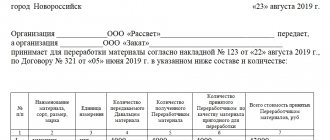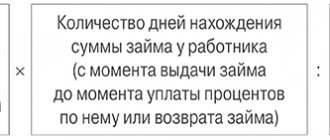How to make a posting in the 1C Accounting 8.3 program - transfer of raw materials for processing?
Often an organization is engaged in the trade of any product, while at the same time the same product is a raw material for other products, the sale of which the company is also engaged in. But for some reason the company cannot produce the necessary products themselves.
There are many such examples. This is, for example, a fabric store that also sells ready-made clothes. The store sends the fabrics for processing and receives back the finished products (clothing).
Let's look at how to formalize the transfer of raw materials and materials for processing in 1C 8.3 Accounting and receipt of finished products.
Documenting
When transferring materials for processing to the contractor, issue an invoice in form No. M-15. In the documents, indicate that the materials were transferred for processing on a toll basis.
After processing the materials, the performing organization must submit the following documents:
- invoice in form No. M-15;
- report on the consumption of materials (clause 1 of article 713 of the Civil Code of the Russian Federation). This document must contain information about materials received and not used for production, the quantity and range of materials (products) received. It also indicates how much waste was received, including returnable waste. The surplus must be returned to the seller, unless otherwise provided by the contract;
- act of acceptance and transfer of work for the cost of processing work (Article 720 of the Civil Code of the Russian Federation).
When receiving materials from processing, the customer must issue a receipt order (Form No. M-4). If finished products are obtained as a result of processing materials, issue an invoice for the transfer of finished products to storage locations (Form No. MX-18).
Receipt of raw materials from the customer
The contractor reflects the raw materials received from the supplier in the program using the document “Receipt for processing”
, which is located in
the Production - Processing
:
Let’s create a new document “Receipt for processing”. It can be filled out automatically if an invoice was previously registered in the program, or you can fill out the item on the “Products” tab of the tabular part of the document manually:
The raw materials received for processing from the contractor will be credited to off-balance sheet account 003.01 “Materials in warehouse”:
Accounting: transfer and processing results
When materials are transferred for processing on a toll basis, sales do not occur, since ownership remains with the organization that ordered the work (Clause 1, Article 220 of the Civil Code of the Russian Federation). Therefore, do not write off the cost of materials from the balance sheet of the customer organization, but take them into account in a separate subaccount 10-7 “Materials transferred for external processing” (clause 157 of the Methodological Instructions approved by Order of the Ministry of Finance of Russia dated December 28, 2001 No. 119n):
Debit 10-7 Credit 10
– materials were transferred for processing.
Further accounting of materials sent for processing depends on the result of processing. Accounting rules vary depending on the following cases:
- the result of processing is a finished product;
- recycling only prepares the material for use;
- recycled materials are used in the manufacture (creation) of fixed assets.
If, as a result of processing, a finished product is obtained, then the processing costs form the cost of the finished product (clause 5 of PBU 10/99). Reflect this operation like this:
Debit 20 (23...) Credit 10-7
– materials from processing are returned and they are taken into account in the cost of finished products;
Debit 20 (23…) Credit 60
– the cost of processing work is taken into account in the cost of finished products.
If materials are prepared for use, processing costs increase the cost of these materials (clauses 68, 71 of the Methodological Instructions approved by Order of the Ministry of Finance of Russia dated December 28, 2001 No. 119n). Reflect this operation like this:
Debit 10 Credit 10-7
– materials from processing were returned;
Debit 10 Credit 60
– the cost of processing work is taken into account in the cost of materials.
If materials obtained from processing are used in the creation (manufacturing) of fixed assets, processing costs form the initial cost of these fixed assets (clause 8 of PBU 6/01). Reflect this operation like this:
Debit 08 Credit 10-7
– materials from processing are returned and they are taken into account in the initial cost of fixed assets;
Debit 08 Credit 60
– the cost of processing work is taken into account in the initial cost of fixed assets.
Production of finished products from customer-supplied raw materials
Products obtained from customer-supplied raw materials are reflected in the document “Production report for the shift”
(section
Production - Product release
).
When filling out the document, we take into account that manufactured products are accounted for in account 20.02 “Production of products from customer-supplied raw materials” at the planned cost.
Example of filling out a document:
The result of posting the document will be the following posting:
BASIC: income tax
The procedure for accounting for the costs of processing materials on a toll basis for taxation depends on whether they form the initial cost of fixed assets or not.
If the cost of processing costs forms the initial cost of fixed assets, write off expenses (in the form of the cost of processing work and in the form of the cost of the materials themselves) through depreciation. For more information, see How to calculate depreciation in tax accounting.
If processing costs do not participate in the formation of the initial cost of fixed assets, apply the following rules. When calculating profit tax, an organization can take into account in material expenses the costs of processing materials (performing part of the production processes) by another organization (subclause 6, clause 1, article 254 of the Tax Code of the Russian Federation). The date of recognition of expenses in the form of the cost of processing work will be:
- with the accrual method, the date of signing the acceptance certificate for the work performed (paragraph 2, paragraph 2, article 272 of the Tax Code of the Russian Federation);
- with the cash method, the date of repayment of the debt to the executing organization (subclause 1, clause 3, article 273 of the Tax Code of the Russian Federation).
The date of recognition of expenses in the form of the cost of materials transferred for processing also depends on which method of calculating income tax the organization uses:
- accrual method;
- cash method.
Unified form KS-2 (filling sample)
The act is drawn up on the basis of the logbook data for the work performed in the required number of copies. If you decide to use a unified form, you must fill it out as follows.
The upper part of the form contains the details of the parties - there are lines for filling in the data of the investor, customer, and contractor. The names of organizations must be written in full, indicating the organizational and legal form, legal address, telephone number, and in the right tabular part indicate the OKPO code. The name and address of the construction site and the name of the object are filled in under the details.
Next, the unified form KS-2 contains the column “Type of activity according to OKDP” - in it you must indicate the code of activity of the customer organization. In the “Contractor Agreement” field, you must indicate the number of the agreement that was concluded between the customer and the contractor, and below fill in the date when it was concluded.
Then the unified form KS-2 contains separate cells where it is necessary to indicate the act number, the date when it was drawn up, and separately indicate the reporting period.
The main part of the form consists of a table that contains 8 columns.
- Contractor number;
- Position number according to the estimate;
- Description of the work performed;
- Quote number;
- Units in which work performed is measured;
- Number of completed works;
- Cost of work performed per unit of work;
- The total cost for the amount of work performed.
The unified form KS-2 is two-sided. At the end of the table on the first page there is a line “Total”. The second page contains a table with the same content as the first page. At the end there are two lines for summing up the final indicators: “Total” according to the information presented on the page and “Total according to the act”.
The act is signed by both parties, the one who handed over and the one who accepted. The position of the signatory is indicated, a signature is placed and a transcript of the signature.
Based on the data contained in the act of acceptance of work performed, a certificate of the cost of work performed and expenses is filled out (form No. KS-3).
Recognition of expenses using the accrual method
When calculating income taxes using the accrual method, apply the following rules. The cost of materials transferred for processing on a toll basis can be taken into account in expenses at the time they are written off for production in the part used in it at the end of the month (clause 2 of Article 272, clause 5 of Article 254 of the Tax Code of the Russian Federation). In this case, the moment of transfer for processing is equivalent to the transfer of materials into production, since processing is one of the stages of production.
If processing costs are classified as direct, then they can be taken into account only after the work is completed (accepted by the customer). Such rules are established by paragraph 2 of Article 318 of the Tax Code of the Russian Federation.
Situation: should materials transferred for processing be taken into account as part of work in progress when calculating income tax?
Answer: yes, it is necessary.
This is due to the fact that the obligation to distribute direct expenses on a monthly basis is established for all production organizations (paragraph 3, paragraph 1, article 319 of the Tax Code of the Russian Federation). And no exceptions are provided for organizations that transfer materials for recycling.
Documentation of the amount of processed materials and unprocessed residue can be done with a report from the recycler. Such reports must contain data in quantitative terms on the consumption of raw materials and materials, on the availability of products that are partially ready.
This point of view is also shared by the tax department (see, for example, letter of the Department of Tax Administration of Russia for Moscow dated August 17, 2004 No. 26-12/54019).
Advice: include in the agreement on the transfer of raw materials to be supplied a condition on the submission by the processing organization of monthly reports on the balances of work in progress. Such reports must contain data on the consumption of raw materials and materials, on the availability of products that are partially ready. The submission of reports by the processor will allow the seller to confirm the validity of writing off direct expenses during a tax audit.
BASIS: VAT
When transferring materials for processing on a toll basis, ownership of them does not pass, therefore this operation is not considered a sale (Article 39 of the Tax Code of the Russian Federation, paragraph 1 of Article 220 of the Civil Code of the Russian Federation). This means that it is not subject to VAT (Article 146 of the Tax Code of the Russian Federation). At the same time, VAT paid for the processing of materials can be deducted if the conditions for its reimbursement are met.
The transfer of inventory items (work, services) to pay for the processing of materials is subject to VAT (subclause 1, clause 1, article 146 of the Tax Code of the Russian Federation).
simplified tax system
If an organization applies a simplification and pays a single tax on the difference between income and expenses, take into account the costs of processing raw materials on a toll basis as part of material expenses (subclause 5, clause 1, clause 2, article 346.16, subclause 6, clause 1, art. 254 of the Tax Code of the Russian Federation).
Work on processing materials must be taken into account if two conditions are met: they are paid for and accepted from the contractor. Please include the cost of recyclable materials in your expenses at the time of payment. Such rules are established by subparagraph 1 of paragraph 2 of Article 346.17, paragraph 2 of Article 346.16 and paragraph 5 of Article 254 of the Tax Code of the Russian Federation.
If processing costs form the initial cost of fixed assets, the organization can also take them into account when taxing. For more information about this, see How to use the simplified tax system to take into account the receipt of fixed assets and intangible assets.
Organizations that use simplification for the object do not take into account income and expenses for processing materials (Article 346.14 of the Tax Code of the Russian Federation).








